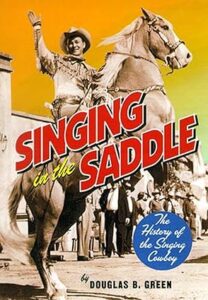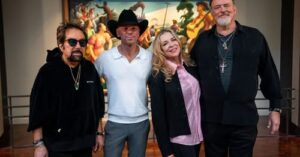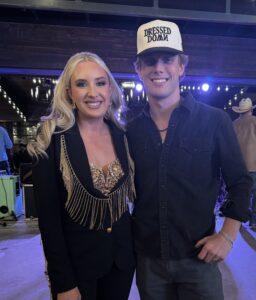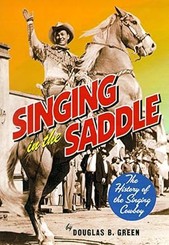Diane’s Country Music Newsletter — 2 April 2025
BOOK REVIEW – SINGING IN THE SADDLE: THE HISTORY OF THE SINGING COWBOY
Gene Autry. Roy Rogers. Tex Ritter. These are the three most famous singing cowboys from the western movies of the 1930s-1950s. But there were hundreds more. Most of them are documented in Singing in the Saddle: The History of the Singing Cowboy, an exhaustive research project by music historian Douglas Green, whose personal zeal shines throughout the book. Not only does Green hold a master’s degree in literature from Vanderbilt University in Nashville, Tennessee, he is a singing cowboy himself. Known professionally as Ranger Doug of the western singing group Riders in the Sky, he is possibly the world’s foremost expert on this topic.
The 324-page narrative held my attention throughout, from the historical overview of the western frontier and the rise of the mythological cowboy, through the decades of singers and western movies. Although most of the musicians and movies were unknown to me, I enjoyed learning about them and hearing more about familiar ones. The book is filled with photos, mostly from the collections of the Country Music Hall of Fame & Museum and the author himself. Green obviously spent untold hours watching old western movies and listening to obscure, scratchy records to be able to categorize and describe them.
Gene Autry, of course, rates his own chapter, as well as being discussed throughout the book. He had 91 starring roles, from his first movie in 1934, In Old Santa Fe, to his last in 1953, Last of the Pony Riders. He also had a lucrative recording career, with numerous non-western hits such as “Rudolph, the Red-Nosed Reindeer,” “That Silver-Haired Daddy of Mine,” and his number one recording of “At Mail Call Today.” He took time out from making movies to fly C-109 transport supply planes in the Army Air Corps during World War II.
While Autry was off to war, Roy Rogers became the top singing cowboy. Known as King of the Cowboys, he starred in movies from 1938 through 1952, before moving to television with The Roy Rogers Show. His wife, Dale Evans, Queen of the West, wrote their signature song, “Happy Trails.” Rogers, who also gets his own chapter, played a dual role in the rise of singing cowboys. Before changing his name and making movies, he was Leonard Slye, co-founder of the Sons of the Pioneers trio in 1932, with singer/songwriters Bob Nolan and Tim Spencer.
“Surely no other group had as profound an effect on the history of western music,” Green writes about the Sons of the Pioneers. They “raised the bar in terms of musicianship, harmony singing, and especially songwriting, where their lyrical musical portraits virtually define the romanticized West . . . painting its colors as no one had done before or has done since.” The trio increased to five and, as members changed, continued to perform for the next seventy years. The Pioneers and numerous similar groups provided harmony vocals and musical instrumentation in the singing cowboy movies. Western swing bands such as those of Bill Boyd and Spade Cooley also participated.
As movie studios attempted to capitalize on Autry’s popularity, their singing cowboys ranged from professional actors and singers dressed as cowboys to true western singers such as Tex Ritter and Rex Allen. During the 1930s, cowboys were romanticized figures for moviegoers trying to escape the realities of the Great Depression. World War II changed the culture to add realism and violence, with less music. Television replaced movies in the 1950s, with westerns no longer containing music.
Green, now 79, was introduced to “the joys of live western harmony singing” by a group that performed at Knott’s Berry Farm in Los Angeles during his childhood. His passion for western music led him to research its history and performers while pursuing his own touring and recording career in the 1980s. He formed Riders in the Sky in 1977 and still leads the band that is today known as the premier western singing group of the modern era.
Singing in the Saddle was originally published in 2002 by the Vanderbilt University Press and reissued in 2024 by the Country Music Foundation Press in cooperation with the University of Illinois Press. In a new preface, Green writes, “It seems very hard to comprehend that it has been nearly a quarter of a century since this history was first published, and perhaps harder to comprehend that I had been at work at it for about that long preparing and researching for it.” The book is chronologically structured, with titles such as “Western Music Rides to the Big Screen” and “Riding into the Celluloid Sunset.” Characters who fit into more than one time period appear in multiple chapters.
“By the early 1970s,” Green explains, “cowboy music was largely a historical curiosity, a piece of nostalgia, an antique music redolent of another time.” The book’s last chapter, titled “Revival,” describes the resurgence of interest in the following 25 years. Riders in the Sky can take partial credit, as can other modern western/cowboy singers such as Michael Martin Murphey, Don Edwards, and Sons of the San Joaquin. Annual western music festivals are held around the nation.
As a biographer myself, I appreciate the research and skill that brought all this music history together. I highly recommend Singing in the Saddle, both as history and as a tool to find recorded western music from the past and live performers in the present.

NEWS
The Country Music Hall of Fame announced its 2025 inductees during a livestream event on March 25. Hearing the three were from North Carolina, Virginia, and Tennessee, I knew already that Jeannie Seely hadn’t been selected again this year. Vince Gill hosted the press conference. As he started talking about his friend in the non-performer category, I guessed it would be Tony Brown. The Greensboro, North Carolina, native—now 79—began as a musician who became a record producer and then label head. During his half-century country music career, he has been the creative force behind over 100 number one hits, according to the Tennessean. One of the artists he signed and produced during his 25 years at MCA Nashville (ten as president) was Vince Gill. June Carter Cash was posthumously named Veterans Era Artist. A Virginia native, she died in 2003 at age 73. She joins her mother, Maybelle Carter, and two husbands, Carl Smith and Johnny Cash, in the Hall of Fame. Her children, Carlene Carter (Carl Smith) and John Carter Cash (Johnny Cash) accepted her award. The Modern Era Artist is Kenny Chesney, 57, from Knoxville, Tennessee. “I was a kid in East Tennessee and I went with my mom and my stepfather to a field about 10 miles from my house to see this group, Alabama,” he said. “Something happened to me that night. There was a fire lit.” All three are worthy of being selected. However, June could have waited until next year. The Hall of Fame needs to induct more than three per year. At a minimum, there should be a Deceased Veteran Performer category.

Nashville Songwriters Hall of Fame member Troy Seals, 86, died at his home in Hendersonville, Tennessee, on March 6. He was born in Big Hill, Kentucky, and began his career at age 17 in 1956. According to MusicRow, he co-wrote more than 75 charted singles, including 30 top 10 hits and 11 number one records. A few of them are “Seven Spanish Angels,” “Lost in the Fifties Tonight,” “There’s a Honky-Tonk Angel (Who’ll Take Me Back In),” “Red Neckin’ Love Makin’ Night,” “Who’s Gonna Fill Their Shoes,” “Ten Feet Away,” “When We Make Love,” “I’ve Got a Rock and Roll Heart,” “Maybe Your Baby’s Got the Blues,” “I Won’t Need You Anymore,” “Bayou Boys,” and the George Jones/Randy Travis duet “A Few Ole Country Boys.” Troy Seals was also a recording artist and a session guitarist. His extended family includes Brady Seals in the band Little Texas, Jim Seals of Seals & Crofts, Dan Seals, Johnny Duncan, and songwriter Chuck Seals.
Jerry Braswell, former bass player with Jim Ed Brown and Del Reeves, died March 12 at age 77. He lived in Villa Rica, Georgia, the state where he was born in 1947. According to his obituary, “he spent his entire life picking and singing gospel music and country music, a passion that resonated deeply within him.” He was a member of The Grand Ole Opry for more than twenty years and is in both the Atlanta Country Music Hall of Fame and the Douglas County Hall of Fame.
Thanks to Paul Leim for sending this information on his group, THE TENNESSEE FOUR. On May 9, 2024, in Greenville, South Carolina, The South Carolina Entertainment & Music Hall of Fame gave The Tennessee Four honorary recognition for their contributions to the Hall of Fame and their dedication to preserving South Carolina’s rich entertainment history. The Tennessee Four features Thomas Gabriel, grandson of Johnny Cash, on vocals. Lead guitarist Kerry Marx is a Grand Ole Opry music producer and member of the South Carolina Entertainment & Music Hall of Fame. He is an original Johnny Cash band member, along with bassist Dennis Crouch and drummer Paul Leim.
Garth Brooks recently completed the 72-show run of his residency at The Colosseum at Caesars Palace in Las Vegas. In almost two years, Garth and his team sold more than 300,000 tickets, 99% of all available tickets, and grossed more than $130 million. According to MusicRow,Garth created 72 unique live music experiences, leading the audience on a personal journey each night, with no two shows ever alike.
Sony Music Publishing Nashville honored Jeannie Seely during Women’s History Month by bringing three reimagined songs (that Jeannie wrote and recorded) to fans through collaborations with rising female country artists. Jeannie has performed over 5,400 times on the Grand Ole Opry stage throughout her nearly 58-year tenure, more than any other country artist in the show’s 100-year history. She says in a press release, “It is one thing to have your old copyrights reinvented in a fresh light, but yet another to be included on the recordings as well! It has been a joy to work with some of the brightest and most talented young artists and musicians who are leading our industry into the future.” The project’s first release featured Mae Estes on “Let’s Get Together,” a previously unreleased song Jeannie wrote with Glen Campbell. The second, “Who Needs You,” features her with Hannah Dasher and Tiera. “Anyone Who Knows What Love Is (Will Understand)” includes Madeline Edwards.
Brenda Lee will once again serve as host of Sunday Mornin’ Country, the country/gospel concert that wraps up CMA Music Fest each year. It will be held Sunday afternoon, June 8, on the Grand Ole Opry House stage. According to a press release, performers include Charlie McCoy, Cowboy Joe & The Babcocks, Cutter & Cash and The Kentucky Grass, Dianne Sherrill, Holly Watson, John Berry, John McCuen, Mandy Barnett, Music City Quartet, and Ray Stevens, with more names announced later.
The estate of Texas Songwriters Hall of Fame member Dan Seals has partnered with Nashville-based record labelMelody Place to release a never-before-heard recording of a song called “Steal A Little Thunder.” It was co-written by his late brother, Jim Sealsof Seals & Crofts fame. Dan gained fame through the duo of England Dan & John Ford Coley in the late 1970s before launching his solo career.
Legendary Canadian country music entertainer Dick Damron died March 29 at a retirement home in Lacombe, Alberta. He was 91. Born Joseph Glenn Damron in 1934, he got his musical start on CKRD Radio in Red Deer, Alberta, with “Dick Damron and The CKRD Nite-Riders.” Following his first Rockabilly recordings in 1959, he went to Nashville in the early 1960s to record traditional country music at Starday and Columbia Studios. Many Canadian and European artists recorded songs he wrote, as did Nashville stars.
Damron was recognized by the Canadian Country Music Association with numerous awards and was inducted into the Canadian Country Music Hall of Fame in 1994. He is a member of the International Country Music Hall of Fame. Thanks to Larry Delaney for sending the obituary.
Bill Anderson reminds us in his fan club newsletter that each current Opry performer will have a night dedicated to them during this 100th Opry anniversary year. He says, “My night will be Tuesday July 15th which marks the date I joined the show 64 years ago. I’m not sure what all will take place that night, but it promises to be exciting.”
LETTERS
Doug Lippert writes from Carmel, Indiana, “While each of your newsletters is eagerly anticipated and chock full of great info, I feel like your most recent one was made for me. As for Paul Riser…my music growing up in Michigan was Motown. And it just so happens that Stevie Wonder and I were both born in Saginaw. A long time ago I got over what type of music I listened to. Now I listen to great music from many genres. Upon my first visit to the Rock and Roll Hall of Fame in Cleveland, while waiting to enter the museum proper, we went into a room and watched a short film; without narration, as I recall. Essentially it began with examples of spirituals and Scottish reels and ended with something like Led Zeppelin. The point was to demonstrate how we got to where we are today with music and the black and Appalachian roots of it all. Please know how grateful we all are for what you do for the music of our lives.”
Eric Calhoun in Los Angeles says, “I wanted to give you all an update on attending this year’s Bonnaroo Festival: This is not going to happen, due to the fact that Cumulus asked me to fill out my name for a drawing, and I did put my name in there, and they never drew my name. For those who like country shows and rodeos, and you are in California, the Clovis Rodeo, clovisrodeo.com, will be taking place outside of Fresno, in Clovis, in April. Kiss Country 93.7, ksks.com, has the info, as well as information about a concert after the rodeo days.”
Jackie Allen Thomas writes from Arizona, “Another great newsletter, keep ’em coming, always good!!!”
Donald Ewert says, “The other day I came across a video on the Classic Country Music channel on YouTube. It was a video of Pop Goes the Country. Diane Jordan, Marty Robbins, and Kenny Price were the guests. I know Diane subscribes to your newsletter so I wanted to tell her I enjoyed seeing her on the show. I can see why Marty was impressed.”
Bobby Fischer writes from Nashville, “When I first met Phil Vassar, he said I’d like to write a song with you sometime. I said I’m writing with Charlie Black across the hall. We wrote ‘Dancin with Dreams.’ It’s on his platinum album. A couple of months ago Lori and I wrote the theme song to a film Lori wrote about Alzheimer’s, ‘Hug the World.’ It’s still fun hummin’ and grinnin’.” He adds, “Gibson has named a guitar in Margo Price’s name. She talks about how she started way back and where I gave them a new Gibson as kids. Great story a tip of the hat to her talent.”
Diane: Here’s the article and interview: Interview: Margo Price on her new signature Gibson Custom J-45, featuring double pickguards with beautiful red-tailed hawk artwork – Gibson Gazette
Martha Moore of so much MOORE media says, “Texas Regional Radio Report’s 2025 ‘New Female Vocalist of the Year’ Tori Martinand ‘New Male Vocalist of the Year’ Hudson Westbrook pose backstage at the 15th annual Texas Music & Radio Awards Show held March 24 in Arlington, Texas. Tori also performed her Top 5 single, ‘Abilene’ (LuckySky Music) on the show.”

SAVE THE DATE FOR RANDY TRAVIS: STORMS OF LIFE BOOK RELEASE PARTY
My book release party for RANDY TRAVIS: STORMS OF LIFE will take place at 3 p.m. on Saturday, June 28, at Legends of Country Music Museum, 2613 McGavock Pike in Nashville. The event will be free to the public. Museum owner Jenny Webb and I are working on the details. This is your save-the-date notice.
VIDEO OF THE WEEK
Here’s a video for Vince Gill fans. Oklahoma Originals is an educational program that focuses on the story of one Oklahoma Hall of Fame Member while promoting civic engagement. On This is Vince Gill, Mike Hearn—along with Shannon Rich, President & CEO of the Oklahoma Hall of Fame—interviewed Vince Gill at the Oklahoma Hall of Fame in early March. They chatted for an hour and 49 minutes. Vince was just his humble self and always willing to express his opinion. He said, “I was never the guy that dreamed about, you know, got in front of the mirror with a hairbrush and posed and ‘I want to be Elvis.’ I was never that guy. I always wanted to be Scotty Moore who played guitar for Elvis. I was a musician first and still am.” Talking about success and failure, he said, “I never felt like a failure because I was doing the best that I had and the best that I could and I knew that it wasn’t in my control” how well people liked a record. The best advice he received was “don’t ever be the best musician in the band. You won’t ever learn anything.” He said, “I think we define people sadly by how many hits they have and by how many records they sold. That never floated my boat. I’m still creative and I’m a better singer, a better songwriter, and a better musician now at 66 than I was when I was 26 or 36 or 46.”
MUSICIANS HALL OF FAME IN NASHVILLE – 2009 (second half)
Surf rock guitarist Dick Dale was known as “King of the Surf Guitar.” He was also called the “Father of Heavy Metal,” due to his combination of loud amplifiers and heavy gauge strings. Born Richard Anthony Monsour in Massachusetts in 1937, he moved with his family to Los Angeles. He was playing in a country band when given the name “Dick Dale” because it sounded like a country singer. He began playing surfer dances in 1961. He released his first records on his own Deltone label with his backup band, The Del-Tones. His hit, “Let’s Go Trippin,” became the first surf rock song. He was inducted in 2011 into the Surfing Walk of Fame in the Surf Culture category. He toured until the end of his life, saying he was forced to keep touring to cover the medical costs of diabetes, kidney failure, and vertebrae damage that made performing excruciatingly painful. He died in Loma Linda, California, in 2019, at the age of 81.
Born in 1936 in Wilmington, North Carolina, Charlie Daniels played in bluegrass and rock bands before moving to Nashville to be a session musician. He served as guitarist on Bob Dylan’s Nashville Skyline in 1969 and Ringo Starr’s 1970 album Beaucoups of Blues. He then formed the Charlie Daniels Band and had his first hit, “Uneasy Rider,” in 1973. Two years later came “The South’s Going To Do it Again” and “Long Haired Country Boy,” followed by his fiddle classic, “The Devil Went Down to Georgia” in 1979. Charlie was inducted into the Country Music Hall of Fame in 2016. He died of a hemorrhagic stroke in 2020 at age 83.
A musical prodigy at age seven, Victor Feldman was born in England in 1934 and played drums in a concert with Glen Miller’s AAF Band at age 10. After emigrating to the United States in the 1950s, he recorded as a session pianist with jazz artists Benny Goodman and Cannonball Adderley. He wrote the title cut for the 1963 Miles Davis album, Seven Steps to Heaven, as well as playing on the session. He recorded with The Wrecking Crew, fellow L.A. session musicians. He was also known for his work with artists such as Frank Zappa, Joe Walsh, and Steely Dan. Following an asthma attack at his home in Los Angeles in 1987, he died of a heart attack at age 53.
The original line-up of Toto, a group of LA’s finest studio musicians, consisted of Jeff and Steve Porcaro, David Paich, guitarist Steve Lukather, and bass guitarist David Hungate (replaced by Mike Porcaro in 1980). The Porcaro brothers were sons of session percussionist Joe Porcaro, and David Paich was the son of arranger Marty Paich. The musicians had recorded with artists such as Steely Dan, Seals and Crofts, Boz Scaggs, and Sonny and Cher, and CBS Records wanted them to put out an album of their own in 1977. After signing Bobby Kimball as lead singer, Toto recorded 18 albums, including hits such as “Hold the Line,” Rosanna,” and “Africa.”

